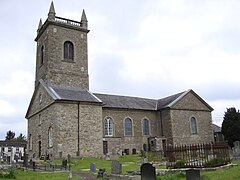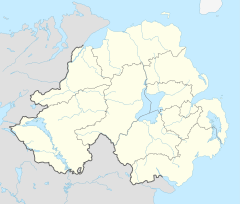Clogher
Clogher
|
|
|---|---|
 Cathedral Church of Saint Macartan |
|
| Clogher shown within Northern Ireland | |
| Population | 308 (2001 Census) |
| Irish grid reference | H538517 |
| • Belfast | 59 miles |
| District | |
| County | |
| Country | Northern Ireland |
| Sovereign state | United Kingdom |
| Post town | CLOGHER |
| Postcode district | BT76 |
| Dialling code | 028, +44 28 |
| EU Parliament | Northern Ireland |
| UK Parliament | |
| NI Assembly | |
Clogher (from Irish: Clochar, meaning "stony place") is a village and civil parish in County Tyrone, Northern Ireland. It lies on the River Blackwater, 18 miles (29 km) south of Omagh. It stands on the townlands of Clogher Demesne and Clogher Tenements. The United Kingdom Census of 2001 recorded a population of 309. The civil parish of Clogher covers areas of County Fermanagh as well as County Tyrone.
The name Clochar refers to something made of stone ('Cloch' is the Irish word for 'stone' and can be anglicised as 'cloch', 'clogh' or 'clough'); probably on the site of the medieval monastery or a nearby ringfort. Archaeological remains from before the 5th century have been found in the vicinity. Clogher is said to have been the location of a gold-covered pagan oracle stone named Cermand Cestach. The story goes that "Cloch-Ór (Golden Stone), may have been a ceremonial or oracle stone (see Cenn Cruaich and Omphalos) originally covered in gold sacred to the druids...given to Mac Cairthinn by an old pagan noble (Cairpre, the father of St Tigernach of Clones), who had harassed him in every possible way until the saint's patient love won the local ruler to the faith." The stone is recorded as being "a curiosity in the porch of the Cathedral of Clogher" in the time of Annalist Cathal Maguire of Fermanagh in the late 15th century. Tighernach of Clones, later succeeded St. Mac Cairthinn as Bishop of Clogher.
...
Wikipedia

